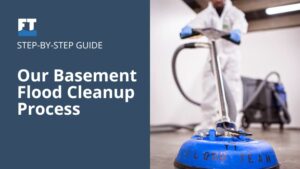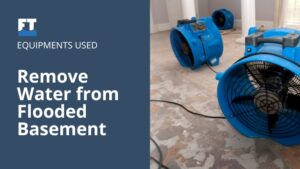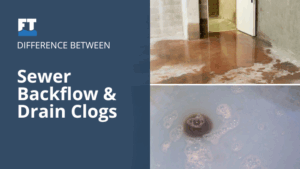A home is only as strong as its foundation. If your home or business has experienced basement flooding or water damage to the foundation, it’s important to repair these areas as quickly as possible to avoid larger structural and property damage issues. A delay in repairs & restoration can end up costing much more in the long run. But aside from standing water, how do you know if your basement is at risk of or has fallen victim to flooding? Keep reading to find out.
Mold
A toxic microorganism that thrives in moist places. Home & business owners are often on the lookout for dark spots that indicate mold has formed. Mold can appear on furniture, wood and other organic materials, walls, and other surfaces. Presentation of mold ranges from dark green to black, & sometimes it even appears as a white powdery substance. But don’t be fooled by lack of splotches — just because you can’t see mold doesn’t mean it’s not there. If you can’t spot anything out of the ordinary, you can sometimes smell it. That’s why it’s important to pay attention to distinctive odors in the basement, so you can identify when your lower level doesn’t smell quite right.
Cracking
Structural deterioration is always a possibility when it comes to flooded basements. This will usually occur in the foundation and/or floor and can happen both inside and outside the home. The most common reasons cracking occurs from water damage is due to excessive moisture from weather and climate and inadequate drainage. Expanding and/or soggy soil can often play a role in this, as well. Keep your eyes peeled for cracks in window seals and door panes too, as this could point to water damage and also lead to bigger problems. If these indicators of basement flooding are not properly sealed to prevent any further moisture from leaking in, emergency flood repair could be looming.
Odor
Everyone’s basement has a certain basement smell, there’s no escaping that. Distinctive odors that could be singular to what you store in your basement don’t necessarily mean there’s water damage or flooding. It’s important to pay attention to a change in the smell if it becomes a strong damp, musty odor that doesn’t go away (even after a storm or wet weather). In most cases, it is mold or mildew that you smell, which means you’ve got moisture or water damage on your hands.
Changes in the color/texture of surfaces
Both walls and floors can show signs of water damage. In a finished basement, wallpaper or paint may peel or appear discolored (usually a yellow or brown color which indicates water stains). Walls may also warp or become bowed as a result of prolonged seepage. In an unfinished basement, a white, salty substance called efflorescence appears on foundation walls and indicates how high water has risen in the basement. If a basement has flooring, it may be swollen or removed from the subfloor. The under-padding in flooring (usually carpet) may also feel spongy, which is an indicator of water damage.
So the next, and most important, question to ask is when was the last time you checked your basement for these signs of flooding? It’s easy to put the possibility out of your mind when you’re not staring at a room full of your belongings floating in two feet of water, water damage is always lurking where you least expect it.
If you know you are at a high risk of flooding or have recently fallen victim to water damage, basement flooding help isn’t hard to find. That being said, you shouldn’t go just anywhere for flood restoration. Whether your sewer has backed up, your sump pump has failed, or you’ve been hit by storm flooding, The Flood Team is ready and equipped to help you get your home back in order. The longer water damage sits untouched, the greater the deterioration of your home and belongings will be. Contact us 24/7 for any kind of basement flood cleanup. We’ll respond immediately & schedule a time for our IICRC-certified technicians to come assess your damages FOR FREE. Call us at 314-310-3064 or visit us online at thefloodteam.fly.








